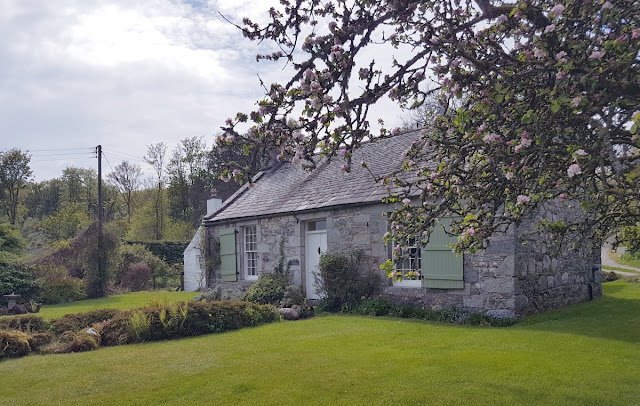Place Names of the Moors & Machars
I'm fascinated by place names, the origins of which tell so much of the people that came before and they tell of times before and a way of life. The Machars with it's proximity to Ireland, Cumbria, The Isle of Man and Wales, and that it's surrounded by waves has ensured that many foreigners trod, passed through and settled in this arable land.
'Machars' is Gaelic, machair, meaning 'low lying fertile land with extensive beaches'.
Ninian, Nynia, is the earliest historical figure associated with the area, and he founded Candida Casa (white house/structure/shed) from Latin, Whithorn, 'white house'.
Early Britons, the Celts, show in the area as Welsh names for example the River Tarf is derived from the Welsh word 'bull', a representation of fertility. Bladnoch, the river, is derived from blawd, flower or corn, and ona - divinity.
Monreith is a mix of Welsh and Gaelic, and means a homestead beside the sea.
An interesting name Pauples Hill, near Bladnoch comes from the Welsh pabell meaning 'tent, temporary dwelling, or booth. Okay so get ready for a really big word, so these Celts praticed 'transhumance', that was big, wasn't it. Go on get it into a conversation. Whereby they moved their cattle to higher ground leaving crops to ripen below in the valley, and they lived in tents. Apparently Roman legionaires called their tents butterflies, papillion and this was adapted.
Cruggleton, as in the church and castle at Sorbie relates to crug, Welsh for a crag and Anglican 'ton' town. The castle their was an ancient fortification possible back to Neolithic times, then various castles over time. There are more mysteries at Cruggleton though.
Glasserton is probably somewhere between, a place of a glassmaker, a worker in glass lives, a place with glass windows or a person who makes glass drinking vessels.
Names ening in 'ton' Anglican generally mean town, whilst 'ham' means homestead, as does tref or threave in Welsh. Run-rig or rig is farmed land in Gaelic in pieces or where they also lived or shared areas by rotation. Auchadh or Auch is a derivation of field in Gaelic. Kirk, church and Chapel Scandinavian Cillin, appear all over. Scottish Gaelic, clachan meaning stone clach variations came to mean hamlet with stone church.
Mochrum, Old English, habitation with a clearing. But old Norse has muk as mouldy, or fusty, damp etc, i.e place in a bog...
Burrow Head is descriptive in that Burrow burh, a fort and headland. Gaelic
Penkiln - penny-land of a little church, Gaelic.
Rispain - bog penny land. Gaelic
Barlamachan - frog height! Maybe there were lots of frogs there.
Wigtown - farm at the top of a hill
Eldrig - deer trap
Some prefixes
Bar Gaelic for top, height, hill.
Barn Gaelic for gap.
Cul Gaelic for corner, neuk or retreat.
Drum Gaelic fir a ridge
Glen Gaelic for glen or valley
Knock Gaelic for a hill or knoll
Blair Gaelic for battle, peat moss
May Gaelic for plain or field
Innis as above
Carse Gaelic for land beside a river
Derry old Irish for a wood
Challock Gaelic for blacksmiths forge
To be completed...


Comments
Post a Comment